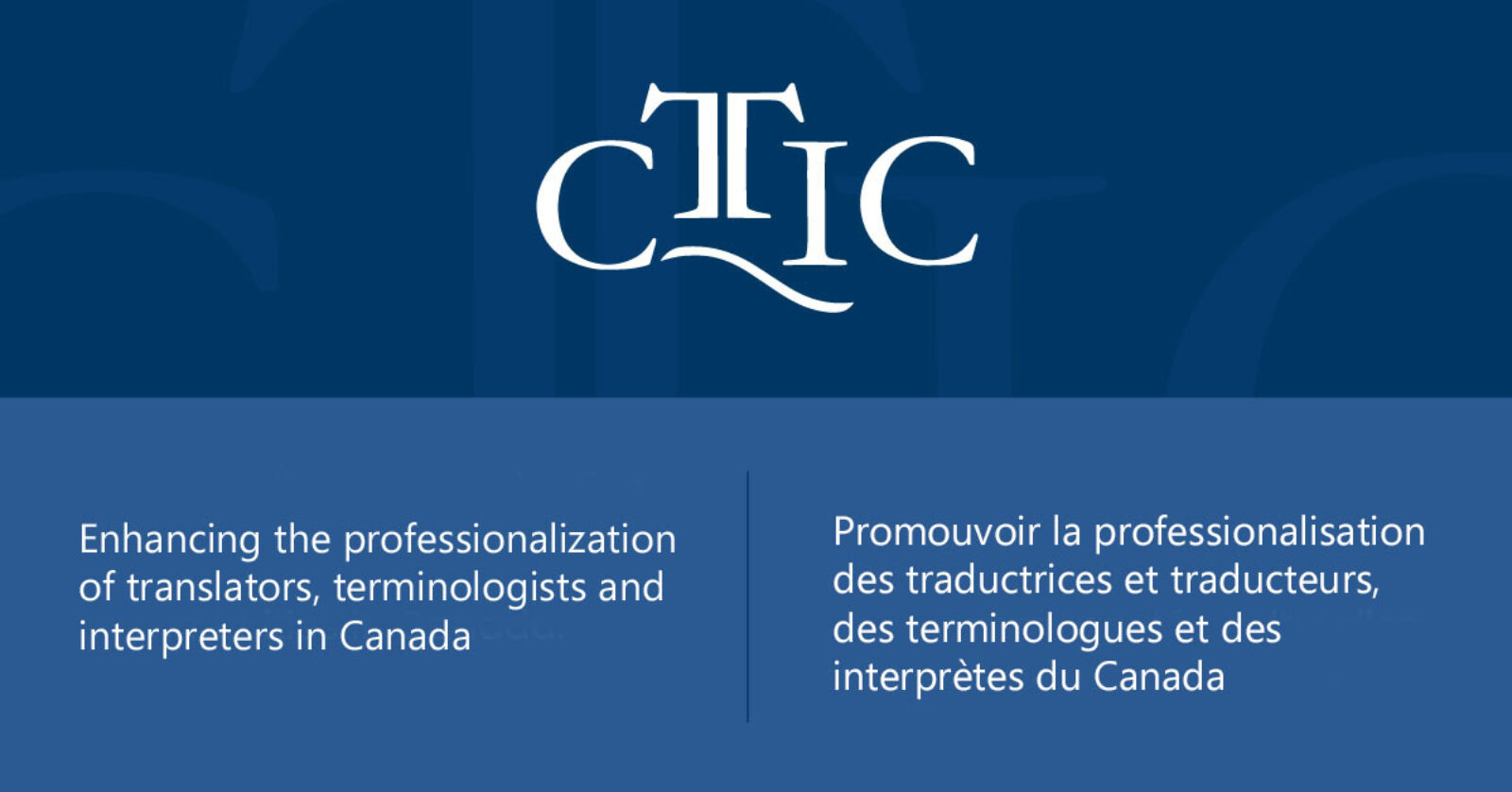An interview with Angela Fairbank, M.A. C.T., CTTIC Vice-President (2019-2022), previously published in the STIBC Voice Newsletter, July 2022, pages 4 to 6.

(c) Claudine Belhomme
Translator, Terminologist, Interpreter – which of these three professions do you identify with?
I identify most with being an interpreter. Ten years ago, I would have given you a different answer because interpretation appeared to be beyond my reach at the time.
During most of my career as a translator, interference from my other languages slowed down my pace considerably. I felt a compulsion to double-check the meaning and usage of every word. I was meticulous in my work but at the cost of normal sleep cycles. I reasoned that if I needed this much time to revise texts, I could never interpret on the fly. However, over time, I became more proficient and this self-imposed training helped prepare me for a career in interpretation. By the time I started officially, I had built up some good linguistic reflexes.
Being someone who loves people and thrives on change, I enjoy the dynamic environment that interpretation affords. I especially appreciate the fact that once an assignment is over, it is over. I no longer have to (nor can I) edit my work endlessly.
Please provide a brief synopsis of your education—including language education—and background related to how you came to be a Translator/Interpreter/Terminologist. For example, immersion in foreign countries and culture, university education, mentorship/menteeship, internship, etc.
I have a specialized Bachelor of Arts degree in English to French Translation from Concordia University in Montreal. I am also currently completing a Master of Arts in Translation Studies.
I was introduced to a multi-language universe when I was small. We spoke Polish at home, I heard my father’s Haitian Creole, I learned French in school, and our family watched English television. However, I chose to become a freelance translator so that I would have the necessary freedom to home-school my three children.
My transition into full-time conference interpretation was a direct result of my membership with the Association of Translators and Interpreters of Nova Scotia (ATINS). Indeed, shortly after my name appeared in the Association’s directory in December 2013, I started receiving calls for conference interpretation events. This steady stream of new clients helped me transition to full-time conference interpreting in December 2016.
How long have you been working in your chosen profession?
I have now been working for nine years as a conference interpreter. As a freelance translator, I worked part-time for five years and full-time for ten years.
Are you currently working in-house or as a freelancer? If you have had experience in both types of employment, which do you prefer?
I currently work as a freelancer. My translation skills would have developed faster had I worked in a firm where a translator typically receives more feedback. But I love the freedom of freelancing. I have an affinity for business, and freelancing allows me to manage my own company.
Where do you currently exercise your profession?
I work in Halifax. I often used to travel outside the city for assignments but then realized my absence was felt at home so chose to restrict my activities to local events. Once Covid hit, the “home” option made family life even better. Ninety-five percent of the meetings I interpret are online.
Are you certified in your profession? If so, by which certification organization(s) and for how long have you been certified now? If you are certified, once you became certified, did you notice your income increase slightly, moderately or substantially?
I am a member of ATINS where I am certified in English to French translation. I am also a candidate for certification in conference interpreting.
My income grew substantially when I became certified. Being listed in the directory has done wonders for my career and business.
What have been some of the highlights of your career so far?
First, the incredible friends that I have made. I am grateful for each of them.
Second, my involvement with ATINS and CTTIC has been very enriching. Working with highly competent people is inspiring and I hope their qualities will rub off on me.
Finally, I love learning and this occupation gives me plenty of opportunity to do so. In fact, it is exciting to participate in events where crucial decisions are made, whether in high-profile entities like the UN or small, local organizations.
Have there been any particular challenges in your profession that you would like to share with our readers?
Working conditions for translators have worsened over the last two decades and for conference interpreters since the advent of Covid. Translators working for agencies must cope with low prices and the relatively unsatisfying and difficult work of translating segments of texts, rather than whole texts. Conference interpreters face health issues caused by poor sound output in remote meetings. Online meetings require them to double as IT/AV technicians, increasing their levels of stress.
What advice do you have for colleagues who are just starting—or thinking of starting—in the profession today?
- Invest in professional development.
- If you are a freelancer, consider yourself a business, and educate yourself on all aspects of this business: marketing, accounting, administration, etc.
- Specialize in one or more fields currently experiencing unmet demand by getting educated and marketing yourself in this niche market. There may be many working translators out there but very few are well versed with the subject matter of their translations. You will gain a competitive advantage and a focus for your efforts to improve.
- Set your price based on a thorough understanding of all your costs, such as overtime hours, administrative hours and materials, rent, phone, transportation, and the services of a bookkeeper, secretary, and accountant.
- Hire an accountant and a qualified bookkeeper.
- Finally, be kind and generous with others and with yourself.
As Past President of ATINS (Association of Translators and Interpreters of Nova Scotia), please tell us about this association, when it was created and why, how many members (certified and candidates for certification) and what challenges it has as a smaller sister society under the CTTIC umbrella. What perks do you offer your members?
ATINS was incorporated under the Nova Scotia Societies’ Act on August 28, 1990. It was founded to advance the professionalization of translators and interpreters in the province. It currently has 71 members, of which 47 are certified and 24 are candidates for certification. Being a smaller society, ATINS has relatively few members. Lower resources limit the scope of the projects we can execute.
As for perks, apart from numerous networking opportunities, ATINS gives its members access to rebates on www.proz.com membership packages and training, to discounts on Notary Pro services (https://www.notarypro.ca/atins), to group rates for liability insurance, and to a special price for Université Sainte-Anne’s micro-certification course in Dialogue Interpretation. Members are also entitled to many free and affordable professional development workshops and to a coveted spot in the association’s website directory.
You became President of CTTIC in November 2021. Congratulations! What do you see as the challenges of CTTIC this year and going forward and how could its affiliate members (certified translators, terminologists and interpreters of its member societies) help CTTIC reach these goals?
Thank you, Angela! It is a joy and an honour for me to be able to serve with CTTIC’s board members, and I am grateful to the Council and especially to the outgoing president, Alexandre Coutu, for their confidence.
CTTIC’s greatest challenge is the continuous improvement of its assessment methods. It is not an easy task. Researchers have been trying for decades to find the best ways to assess translation quality with limited success. Our job is to pioneer data-driven and common-sense solutions that will make certification results reflect the proficiency level of each exam candidate more perfectly.
The second challenge is a Canadian one: the need for more qualified interpreters. This is especially true for court, medical, and community interpreters. Poor-quality interpretation in these fields generally carries heavy consequences: inappropriate medical treatments, unfair sentencing, etc. Tragically, these services are still often being performed by unqualified interpreters, sometimes even by family members, where many ethical rules are easily broken. Officials responsible for obtaining interpretation services often greatly underestimate the complexity of the task, the needed training, and the extremely high risks involved.
Whether they are certified, working towards certification, or not seeking certification, the best way that translators, terminologists, and interpreters can help CTTIC reach its goals is to work diligently at improving their skills and overcoming every weakness. They should set the bar high and work tirelessly to achieve it. And once they feel they have, they should seek certification. Every level of Canadian society and beyond will benefit from having accurate, precise, and beautiful multicultural communications.
Is there anything I missed that you would like to add?
No. Thank you for this lovely opportunity!
